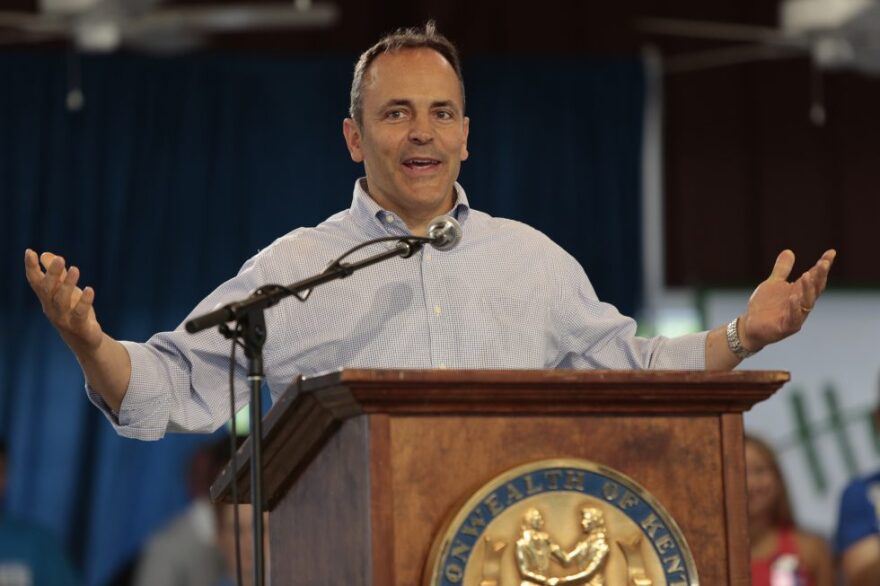A judge has ruled that Gov. Matt Bevin cannot unilaterally reorganize a public university’s board of trustees and dismiss all of its members, calling it an “unprecedented assertion of executive power.”
In June, Bevin issued an executive order abolishing the University of Louisville’s board of trustees, citing dysfunction on the board. He later created a new board and appointed all new members. Attorney General Andy Beshear sued Bevin over the move.
Though state law allows governors to unilaterally reorganize state boards, the power had never been applied to a public university board.
On Wednesday, Franklin Circuit Court Judge Phillip Shepherd ruled that the governor can’t remove public university board members without cause.
“Governors, who have not been shy about asserting executive powers, have dealt with these situations by requesting (and obtaining) resignations of board members, or have allowed the disputes to be settled through the normal administrative and judicial processes,” Shepherd wrote in his opinion. “No prior Governor has ever attempted to invoke the re-organization power…to address problems in the governance of public universities.”
Shepherd had already temporarily blocked Bevin’s reorganization of the U of L board while the lawsuit was pending. The “old” version of the board has been meeting since last month.
Bevin has not filled five vacancies on the board as the case continues to unfold in the courts. He will have the opportunity to appeal the case to the Kentucky Court of Appeals or request that it be fast-tracked to the Kentucky Supreme Court.
Beshear called on Bevin to accept the ruling and fill the vacancies or appeal the case.
“What our students and faculty need now is finality,” Beshear said. “That is why I am calling on Bevin to either accept the ruling and appoint trustees to the five openings, or agree to move this case immediately to the Kentucky Supreme Court.”
U of L Foundation chair Brucie Moore issued a statement saying she believed Shepherd’s opinion followed the law and called on Bevin to immediately fill the five vacancies on the Board of Trustees.
“The Board needs the expertise of the additional members to assist in dealing with the complex issues inherent in the operations of a university,” Moore said. “In March, Bevin agreed to appoint at least two minority members. At the very least, I encourage Bevin to make those two appointments so the Board of Trustees can begin the critical business of searching for a new University President.”
Moore also said Bevin could make those appointments and still maintain his arguments if he decided to appeal the ruling.
In a statement, U of L Board chair Larry Benz said he “will continue to not make any comments on legal matters regarding the Board of Trustees.”
“It is an honor and a privilege for all appointed trustees to serve the University of Louisville,” Benz said. “We look forward to continuing with Dr. Pinto and the Office of the President, students, faculty and staff in the ongoing progression of student success, breakthrough research and community engagement.”
Acting university president Neville Pinto said he looks forward “to a final resolution of this issue.”
“In the meantime, the University of Louisville continues in its commitment to providing high quality education to our students, conducting groundbreaking research and being engaged in the community we serve,” Pinto said in a written statement.
Bevin abolished the 17-member U of L board last month in a surprise announcement, citing “dysfunction” and “enmity” between factions on the board. In his executive order, Bevin said the behavior was “seriously damaging to the entire University community.”
Over recent years, divisions had emerged on the board between supporters and detractors of former university president James Ramsey.
In his order, Shepherd criticized the governor’s assessment of the board, saying that the “charges malign the integrity and competence of Board members.”
“The charges were leveled by the Governor with no notice to Board members of the charges, no opportunity to contest their validity, and no recourse whatsoever, solely by the unilateral fiat of the Governor,” Shepherd wrote. “He served as judge, jury, and executioner of the incumbent Board.”
At the same time Bevin announced the reorganization, he distributed a letter from Ramsey that revealed he would step down from his post as president. In the letter to the governor, Ramsey stated that he “appreciated our recent conversation,” described a need for a “fresh start” and then declared that he would retire or resign.
In the order, Shepherd said that the correspondence “confirms” that Ramsey agreed to resign if Bevin abolished the U of L board, which the judge said violates state law.
“Accordingly, the Court makes a factual finding, based on the only evidence in the record, that the Governor improperly agreed to fire and replace the Board of Trustees as a condition of obtaining Dr. Ramsey’s agreement to resign,” Shepherd wrote.
The move has raised concerns with the Southern Association of Colleges and Schools, which accredits U of L. Last month, SACS sent a letter to the school’s interim president, Neville Pinto, citing concerns with Bevin’s “alleged negotiation of the resignation of a university president” and “removal of board members without due process.”
At issue is whether the organization thinks there is “undue political influence” on the school’s governance, which is forbidden by SACS’ accreditation principles.






